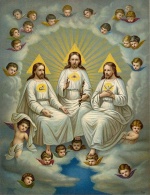William Branham and the Trinity Doctrine: Difference between revisions
No edit summary |
|||
| Line 30: | Line 30: | ||
:''We do not think it open to full explication in human thought. It is not wise to attempt more than is attainable. Yet the manifest prudence of this law has often been violated in strivings after an unattainable solution of this doctrine. We shall not repeat the error. Still, the divine Trinity is so manifestly a truth of Scripture, and so cardinal in Christian theology, that the question cannot be omitted. If a full solution cannot be attained, the facts may be so presented as not to appear in contradictory opposition. With this attainment, nothing hinders the credibility of the doctrine on the ground of Scripture.'' <ref>John Miley, Systematic Theology, Volume 1, 223 (New York: Hunt & Eaton, 1892)</ref> | :''We do not think it open to full explication in human thought. It is not wise to attempt more than is attainable. Yet the manifest prudence of this law has often been violated in strivings after an unattainable solution of this doctrine. We shall not repeat the error. Still, the divine Trinity is so manifestly a truth of Scripture, and so cardinal in Christian theology, that the question cannot be omitted. If a full solution cannot be attained, the facts may be so presented as not to appear in contradictory opposition. With this attainment, nothing hinders the credibility of the doctrine on the ground of Scripture.'' <ref>John Miley, Systematic Theology, Volume 1, 223 (New York: Hunt & Eaton, 1892)</ref> | ||
=Not Three Gods= | |||
John Calvin in addressing this issue stated the following: | |||
:''Sabellius says that the Father, Son, and Spirit, indicate some distinction in God. Say, they are three, and he will bawl out that you are making three Gods. Say, that there is a Trinity of Persons in one Divine essence, you will only express in one word what the Scriptures say, and stop his empty prattle. Should any be so superstitiously precise as not to tolerate these terms, still do their worst, they will not be able to deny that when one is spoken of, a unity of substance must be understood, and when three in one essence, the persons in this Trinity are denoted. When this is confessed without equivocations we dwell not on words. But I was long ago made aware, and, indeed, on more than one occasion, that those who contend pertinaciously about words are tainted with some hidden poison; and, therefore, that it is more expedient to provoke them purposely, than to court their favour by speaking obscurely.<ref>John Calvin, Institutes of the Christian Religion (Bellingham, WA: Logos Bible Software, 1997).</ref> | |||
Revision as of 03:32, 30 May 2013
References
|
